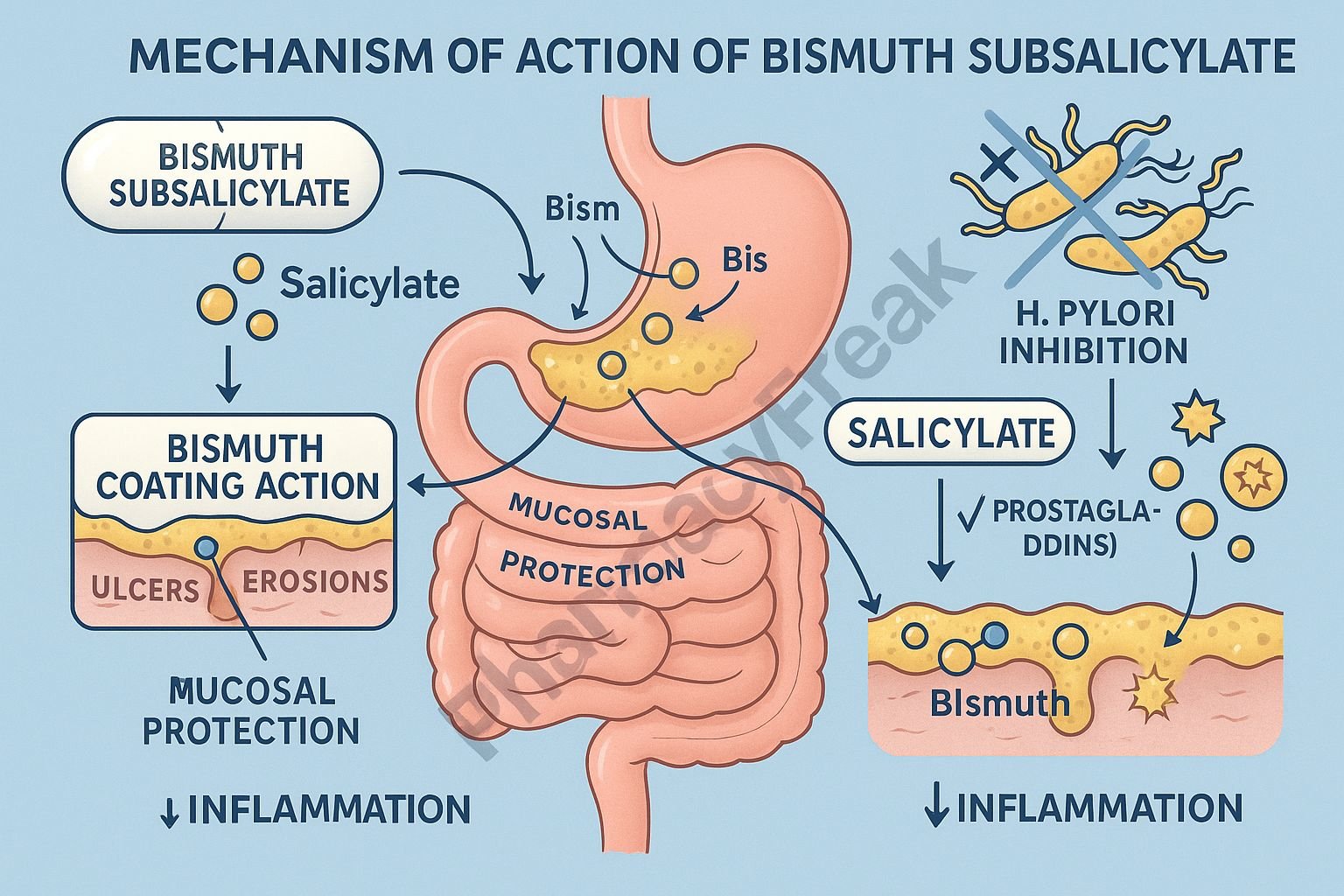Table of Contents
Introduction
Bismuth subsalicylate is an antidiarrheal, gastroprotective, and antimicrobial agent commonly used in the treatment of acute diarrhea, traveler’s diarrhea, dyspepsia, and H. pylori–associated gastritis. It is the active ingredient in many over-the-counter formulations used for stomach upset.
Its mechanism of action is multifactorial, involving protection of the gastric mucosa, reduction of inflammation, inhibition of prostaglandins, and direct antimicrobial activity—especially against Helicobacter pylori.


Mechanism of Action (Step-wise)
1. Gastrointestinal Mucosal Protection
Bismuth forms a protective coating over ulcers and erosions.
Mechanism:
- Binds to exposed mucosal proteins
- Creates a physical barrier against gastric acid and pepsin
- Enhances secretion of protective mucus and bicarbonate
Effect: Protects the gastric lining and promotes ulcer healing.
2. Antisecretory Action via Salicylate Component
The salicylate portion inhibits prostaglandin synthesis in the intestinal mucosa.
Effects:
- ↓ Intestinal inflammation
- ↓ Hypersecretion of fluids
- ↓ Intestinal motility
- ↓ Gastrointestinal irritation
This helps reduce watery stools in diarrhea.
3. Antimicrobial Activity Against H. pylori
Bismuth salts exhibit direct antimicrobial action.
Mechanisms include:
- Disrupting bacterial cell walls
- Inhibiting ATP synthesis
- Preventing bacterial adhesion to gastric mucosa
- Synergistic action with antibiotics in H. pylori therapy
Effect: Effective adjunct therapy in H. pylori eradication regimens.
4. Binding of Bacterial Toxins
Bismuth subsalicylate binds and neutralizes toxins produced by:
- E. coli (important in traveler’s diarrhea)
- Other enteric pathogens
Effect: Reduced irritation and inflammation of the intestinal tract.
5. Antidiarrheal Action
Bismuth subsalicylate reduces stool frequency through:
- Fluid absorption enhancement
- Anti-inflammatory effects
- Antimicrobial activity
- Reduction of intestinal hypermotility
6. Summary of Mechanism
| Mechanism | Effect |
|---|---|
| Mucosal coating | Protection, ulcer healing |
| ↓ Prostaglandins | Anti-inflammatory, antisecretory |
| Antimicrobial | H. pylori suppression |
| Toxin binding | Reduced diarrhea severity |
| ↓ Fluid release | Stool normalization |
Pharmacokinetics
- Absorption: Bismuth minimally absorbed; salicylate well absorbed
- Distribution: Salicylate widely distributed
- Metabolism: Salicylate metabolized in liver
- Excretion: Renal elimination
- Onset: Within 4–6 hours
Clinical Uses
- Acute diarrhea
- Traveler’s diarrhea
- Dyspepsia
- H. pylori infection (part of quadruple therapy)
- Gastric/duodenal ulcer protection
- Nausea and indigestion
Adverse Effects
- Black tongue
- Black stools (harmless)
- Salicylate toxicity at high doses (tinnitus)
- Constipation
- Rare neurotoxicity with chronic high-dose use
- Avoid in children with viral illness (Reye’s syndrome risk)
Contraindications
- Aspirin allergy
- Peptic ulcer bleeding
- Renal insufficiency
- Children recovering from viral infections
- Pregnancy (caution)
Comparative Analysis
| Feature | Bismuth Subsalicylate | Loperamide | Ranitidine |
|---|---|---|---|
| Main action | Antimicrobial + mucosal protection | Motility inhibitor | Acid suppression |
| H. pylori effect | Yes | No | No |
| Antidiarrheal strength | Moderate | Strong | None |
| Anti-inflammatory | Yes (salicylate) | No | No |
MCQs
1. Bismuth subsalicylate protects the stomach primarily by:
a) Decreasing acid secretion
b) Forming a mucosal coating
c) Increasing prostaglandins
d) Blocking H2 receptors
Answer: b) Forming a mucosal coating
2. The salicylate component acts by inhibiting:
a) Leukotriene synthesis
b) Prostaglandin synthesis
c) Dopamine receptors
d) Serotonin transporters
Answer: b) Prostaglandin synthesis
3. Bismuth is effective against which organism?
a) Giardia
b) H. pylori
c) Rotavirus
d) Candida
Answer: b) H. pylori
4. Black stools seen with bismuth are due to:
a) GI bleeding
b) Iron absorption
c) Bismuth sulfide formation
d) Peptic perforation
Answer: c) Bismuth sulfide formation
5. Bismuth subsalicylate should be avoided in:
a) Traveler’s diarrhea
b) Aspirin allergy
c) Dyspepsia
d) Mild diarrhea
Answer: b) Aspirin allergy
FAQs
Q1. Why does bismuth turn the tongue black?
It forms harmless bismuth sulfide when reacting with sulfur in saliva.
Q2. Can it be used for H. pylori treatment?
Yes, as part of quadruple therapy.
Q3. Is bismuth safe for children?
Avoid in children recovering from viral infections due to Reye’s syndrome risk.
Q4. Can bismuth cause constipation?
Yes, mild constipation can occur.
Q5. Does bismuth reduce stomach acid?
No, it protects the mucosa and reduces inflammation but does not suppress acid.
References
Goodman and Gilman – Pharmacological Basis of Therapeutics
Katzung – Basic and Clinical Pharmacology
Tripathi – Essentials of Medical Pharmacology
Harrison – Principles of Internal Medicine

I am pursuing MBA in pharmaceutical management from NIPER Hyderabad with a strong academic record and proven success in national-level pharmacy entrance exams. I secured AIR 61 in NIPER 2024 (MS/M.Pharm) and AIR 27 in NIPER MBA, along with AIR 147 in GPAT 2024 and AIR 907 in GPAT 2023. I also achieved AIR 6 in AIIMS CRE-2025 for Drug Store Keeper and was selected as a Pharmacist (AIR 61) for ESIC. Additionally, I was the Runner-Up in Round 2 of the EY Case Study Competition.
At PharmacyFreak.com, I aim to guide future pharmacists through expert content, exam strategies, and insightful resources based on real experience and academic excellence.
Mail- harsh@pharmacyfreak.com

